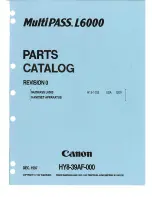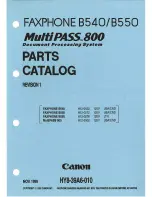
14
Pulley Bearing Replacement
This job requires a set of retaining ring plyers, safety glasses and the proper replacement bearings as
well as some general hand tools. The bearings used here are 6203 bearings with double seals. These are
available from Onfloor, part number 245321. It is very important to wear the safety glasses especially
when removing and installing the retaining rings. If you do not have retaining ring plyers they can be
purchased at Lowes, Home Depot, Harbor Freight, and other tool stores for about $20.
Once the bearings are determined to be in need of replacement, follow the steps below to remove the
pulley(s) that need replacement bearings:
1.
With the handle in the straight up position, tilt the machine to its side so the machine is resting
on the side of the outer bowl and one of the handle grips. This makes the machine stable and
less likely to tip over.
2.
Remove the tools.
3.
Remove the 9 fasteners around the perimeter of the dust cover. On some machines these were
Philips head screws. On later machines these are ¼-20 hex head bolts requiring a 7/16 socket
and rachet or a 7/16 wrench. Remove dust cover.
4.
Remove belt keeper plates on the face of each pulley. To do this you will need to remove the 3
small screws on older machines. On later model machines it is only necessary to remove the
single hex head bolt on each pulley. Then rotate the keeper plate a few degrees until the
keyhole openings in the plate align with the remaining screw heads and lift the plate off.
An
upgrade kit is available to change to this new keeper plate system. For all 16” machines built
since 2007 and for 20” machines built prior to
the heavy-duty belt system the part number for
the upgrade kit is 603775. For 20” machines with heavy duty belt systems the kit number is
603783. There are some much older machines built before 2007 that have pulleys without
holes that the kits will not work on.
5.
Wear gloves to work the belt off the pulley teeth while slowly rotating pulley. Belt will come off
the large pulley. Be careful not to pinch your fingers.
6.
To remove pulley, use a deep well 15/16 socket wrench to remove the locking hex nut located
down inside the pulley center opening. The flat washer located behind the nut is a 16mm flat
washer and not a standard SAE type so be careful not to lose them as they may be challenging
to purchase locally. Pull the pulley straight out and away from the machine. There is also a small
spacer located behind the pulley. Be careful not to lose this as well.
With the pulley removed we can proceed with bearing replacement. Look at the pulley from the back
and you will see the retaining ring that secures the bearings in place. Wearing your safety glasses and
using the retaining ring plyers remove the retaining ring.
Installation Using a Press
The best method to remove and install new bearings is to take the pulley to a hydraulic press and press
the bearings in and out. When using this method, it is important to properly support the pulley to allow
space for the old bearings to exit. This is accomplished by supporting the pulley as close to the center as
practical using 2 pieces of 2 x 4 lumber or 2 pieces of equal thickness steel. When pressing the old
bearings out it is acceptable to use almost any device as a pushing tool as long as it will fit through the
center opening without touching the pulley. This means a piece of metal tubing or rod or even a piece of








































